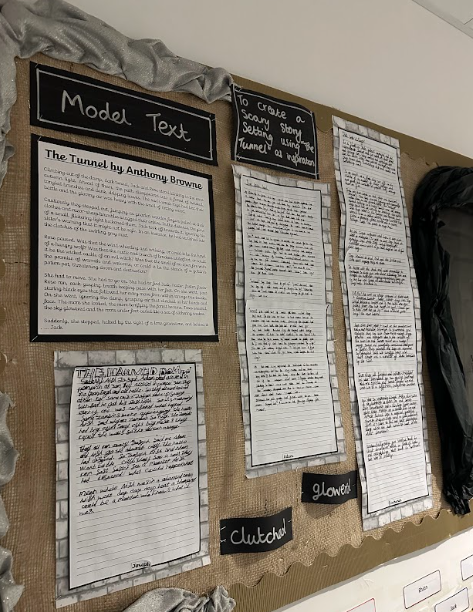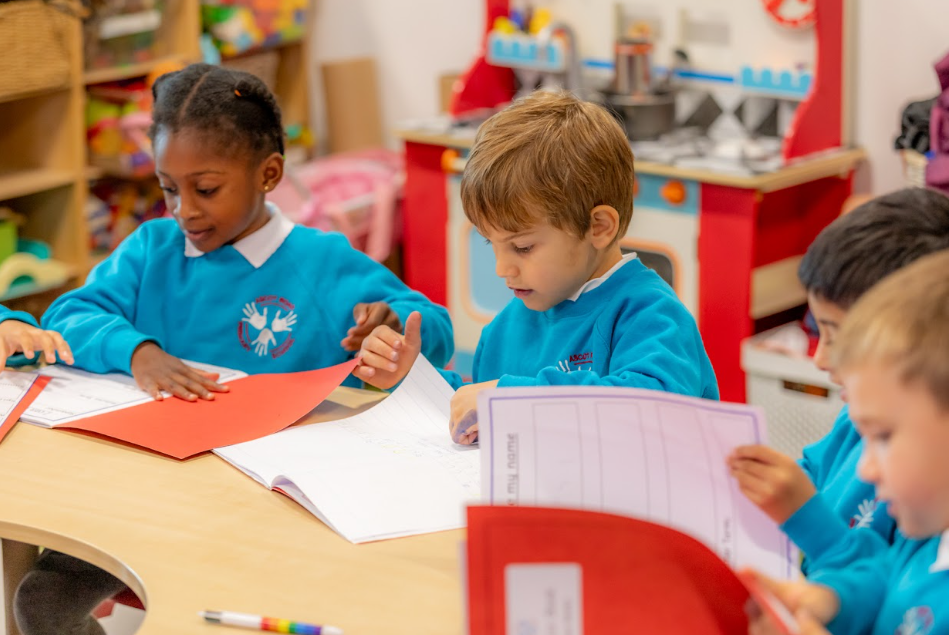Writing

Intent
Through our writing curriculum, we aim to promote high standards of language and literacy by equipping pupils with a strong command of the spoken and written language. Pupils are supported to develop their love of writing through our ‘Talk For Writing’ approach.
Our curriculum for writing ensures that all pupils:
• read easily, fluently and with good understanding
• acquire a wide vocabulary, an understanding of grammar and knowledge of linguistic conventions for reading, writing and spoken language
• appreciate our rich and varied literary heritage
• write clearly, accurately and coherently, adapting their language and style in and for a range of contexts, purposes and audiences
• use discussion in order to learn; they should be able to elaborate and explain clearly their understanding and ideas
• are competent in the arts of speaking and listening, making formal presentations, demonstrating to others and participating in debate
Promote Cultural Awareness
We aim to expose students to a diverse range of texts from around the world, fostering an appreciation for cultural diversity and promoting empathy and understanding. We celebrate and showcase student writing both within our school community and beyond, recognising and valuing each student's unique writing journey and accomplishments. Writing is displayed in class and around the school on dedicated writing displays. Published writing is shared with parents, so that they are aware of the accomplishments of their children and can see the progress they are making.
Implementation
We want to help all our pupils to develop into creative writers. We achieve this through the Talk for Writing approach. It enables pupils of all ages and abilities to learn to write a wide range of stories and varying text types. The multi-sensory and interactive teaching activities used include:
-
Listening to and learning texts and stories;
-
Taking part in drama and role-play;
-
Drawing and story mapping;
-
Using exploratory and presentational talk:
-
Collecting words and language strategies;
-
Building their working knowledge of grammar;
-
Taking part in debating and discussion.
Talk for Writing is an innovative approach to teaching writing. It was developed by the literacy specialist and writer Pie Corbett. It uses high quality model texts to introduce the pupils to different story/text types. They then learn these off by heart and scrutinise with a writer’s critical eye
They learn the underlying structures and the process of planning using story maps. They also learn about the key strategies for creating interesting characters and settings. They learn to use a range of sentence types and literary devices to create different effects including suspense or adventure.
Talk for writing has three key phrases which work together to develop knowledge, confidence and independence in writing.
Imitation and Immersion
Talk for Writing units begin with a hook which fires up the creativity and imagination of the children before they are immersed in the model text. During this phase, the pupils learn the text using actions and story maps. The key to success for the pupils is that they internalise the text type through repetition and rehearsal. They explore the structure of the narrative and investigate the different characters, settings and events. They also begin to look closely at the language used and the effects this has on the reader. The pupils ‘read as a reader’ and ‘read as a writer’ during this process. The classroom becomes a dynamic, interactive resource filled with word ideas, sentence types and language tools collected by the pupils to use in their stories later.
Innovation
During this phase, the teacher and the pupils begin to change aspects to model the text using their own ideas. They explore the text using different characters, settings or events and develop new ideas for descriptive language whilst sticking closely to the underlying structure.
It is during this phase that the pupils work using their toolkits. The toolkits, based on the features and ingredients of the model text, remind pupils of the different strategies they could use in their stories and help them to see the progress they are making.
Invention
During the invent stage, the pupils plan and write their own story based on the text type they have been learning. They experiment with the ideas and begin to explore their own style of writing – they are able to do this by hugging the original model text tightly or they can develop in their own way – flying away from the text.
In order to develop independence, we have implemented a new structure that provides pupils with the opportunity to have more freedom and choice with their writing. The teacher, on occasion, may choose to skip the imitation stage and move to the invention stage. An extra stage would then be added where the pupils will be provided with a stimulus, such as a short video, a picture or a story opening, and will then be allowed to choose one of the four purposes for writing (to entertain, to persuade, to discuss, to inform). The pupils will then plan their own piece of writing using a text map and will then independently create and edit a piece of writing.
The teacher may also choose to do this to extend high attaining writers by providing them with the opportunity to write at length in a way that will stimulate their interests and creativity.
We believe that by providing this choice, it will further develop a love for writing and will also provide each child with a bank of truly independent pieces of writing that can be used for assessment purposes.
Each term also includes a week of poetry teaching and a whole school invention.
Handwriting
Explicit, weekly handwriting lessons are taught using the children’s spellings each week. Handwriting is modelled by teachers in class and all children are expected to be writing cursively by year 3 where they will also begin to write using a black handwriting pen.
Impact
Our aim is for children to leave Ascot Road as confident and imaginative writers who are passionate about putting their thoughts and ideas onto the page.
Our children will be equipped with a strong command of the written word. They will amass a varied vocabulary which they can use across the curriculum and spelling accurately and use correct grammar in their work. Pupils will write clearly, accurately and coherently, adapting their language and style in and for a range of contexts, purposes and audiences. By the end of Year 6, our children are well-prepared for the secondary curriculum.
Writing is moderated between classes and in phase groups on a half termly basis alongside the school’s KPIs for assessment. At the end of each unit, a ‘hot task’ will be completed by the children and then assessed. This is an independent piece of writing that implements everything that has been covered in the Talk For Writing unit. At the beginning of each unit, a ‘cold write’ is completed which allows the teachers to plan ahead and address any misconceptions.
What does writing look like in Reception?

Right at the the very beginning of Reception, children are encouraged to make marks using a variety of tools such as pencils, crayons, chalk, and paintbrushes. This could include scribbling, drawing, or making patterns, which lays the foundation for writing.
Teachers also provide meaningful contexts for writing by incorporating writing into everyday activities and experiences. This could include writing shopping lists, writing letters or postcards, writing invitations for classroom events, or writing thank-you notes.
Adults play a crucial role in supporting children's writing development by providing encouragement, modeling writing behaviours, and offering scaffolding when needed. They might write alongside children, demonstrate how to form letters, or engage children in shared writing activities.
There are also writing areas within the classroom where children can access a variety of writing materials such as paper, pencils, markers, stamps, and stencils. They can freely explore and experiment with these materials to express their ideas through writing.
Our Outdoor environment provides rich opportunities for mark making and writing. Children might use chalk to write on the pavement, create stories with natural materials like sticks and leaves, or write in sand or mud.
In Reception, we follow the Read Write Inc Program that teaches children to begin forming their letters correctly. They then learn to use their phonetic knowledge to blend short words (CVC words.) When children become more confident independently writing words, they begin to learn how to structure sentences both orally and written.
Alongside RWI, children in Reception follow the Talk for Writing structure. This provides children with a core understanding of how texts are composed, formed and structured. Our talk for writing lessons focus on expanding children’s vocabulary and applying their phonetic knowledge within their writing. Children are exposed to a wide range of fiction and non-fiction texts such as short stories, fact files and letters.
How are SEND children supported with writing?
Children with a SEND need, access writing at Ascot Road through inclusive approaches that accommodate their individual needs and abilities. Strategies include differentiated instruction, visual supports, sensory integration, adaptive equipment, peer support, choice and autonomy, individualised goals, and celebrating diversity. Resources such as sentence starters, key vocabulary and adapted model texts also help to support the learning of children with a SEND need. These practices ensure that SEND children have equal opportunities to engage, develop creativity, and express themselves alongside their peers, fostering a sense of belonging and achievement. The Talk For Writing framework also lends itself to easily adaptable learning outcomes for all children.
Culture
Our school fosters a vibrant culture of writing through a comprehensive curriculum, that includes:
-
Dedicated display boards to showcase every year group’s writing
-
Creative Writing After School club run by our passionate Learning Support Practitioner
-
Author visits
-
Writing competitions
-
Writing workshops to support parents
-
Writing focuses in all areas of the curriculum, not just English
-
A write, edit and publish approach to ‘big pieces’ of writing


